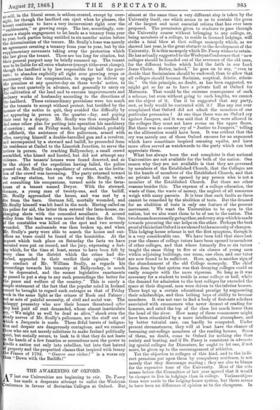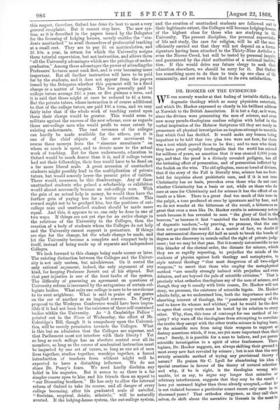THE AWAKENING OF OXFORD.
T last our Universities are beginning to stir. Dr. Pusey has made a desperate attempt to enlist the Wesleyan onference in favour of Sectarian Colleges at Oxford. But almost at the same time a very different step is taken by the University itself, one which seems to us to contain the germ of the largest and most essential reform that has ever been proposed. The permission given to students to pass through the University course without belonging to any college, or, being members of a college, to reside in licensed lodgings, will strike a fatal blow at that college monopoly which, as we showed last year, is the great obstacle to the development of the University. It is this monopoly which Dr. Pusey wishes to retain.
He has actually suggested to the Wesleyan Conference that "new colleges should be founded out of the revenues of the old ones, for the different bodies which hold the faith in our Lord Jesus Christ. Better, indeed," he goes on to say, "even to decide that Socinianism should be endowed, than to allow that all colleges should become Socinian, sceptical, deistic, atheis- tic." On this principle, no doubt, as has been suggested, we might get so far as to have a private hall at Oxford for Mormons. That would be the extreme consequence of such a scheme, but even without going to such lengths, we cannot see the object of it. Can it be suggested that any party, sect, or body would be contented with it ? Has any one ever complained that Oxford did not admit the members of one particular persuasion At one time there was an Oxford cry against Jumpers, and it was said that if they were allowed in the colleges they must not have rooms on the upper floors. But there was no counter cry of "Justice to Jumpers," telling as the alliteration would have been. It was evident that the cry was merely one of those Oxford excuses for an argument which have sometimes inspired amusing squibs, and have more often served as watchwords to the party which can best appreciate them. What has always been the real complaint is that national Universities are not available for the bulk of the nation. One reason why they are not available is that they are governed by members of the Established Church, that the Colleges are in the hands of members of the Established Church, and that no private hall can be opened by any person who is not a member of the Established Church. But there are other reasons besides this. The expense of a college education, the- waste of time, the waste of money, the neglect of all resources weigh with many parents. It is true that such faults as these- cannot be remedied by the abolition of tests. But the demand for an abolition of tests is only one feature of the present.
movement. We want the Universities to be open to the nation, but we also want them to be of use to the nation. The two demands necessarily go together, and every step which is made towards procuring the one helps on the other. Perhaps the best proof of this is that Oxford is awakened to the necessity of changes.
This lodging-house scheme is not the first symptom, though it is a very considerable one. We have been told that since last year the classes of college tutors have been opened to members of other colleges, and that where formerly five or six tutors taught the same thing to five or six classes of young men within adjoining buildings, one room, one class, and one tutor are now found to be sufficient. Here, again, is another sign, of the abandonment of the old College monopoly. The chief harm done by that system was that decaying colleges could so easily compete with the more vigorous. So long as it was necessary for a student to reside in some college or hall, while the demand for admission to the best colleges far exceeded the space at their disposal, men were driven to the inferior houses. These kept up a certain educational prestige by augmenting their scholarships, and thus bribing boys of ability to become members. It was not rare to find a body of first-rate scholars associated with commoners who never dreamt of reading for honours, and rated the top of the class list much lower than the head of the river. How many of these commoners might have been stimulated by a more intellectual atmosphere, and by better tutorial care, can hardly be computed. Under present circumstances, they will at least have the chance of becoming out-college members of the reading houses. Some of them, no doubt, come to Oxford for nothing else than society and boating, and if Dr. Posey is consistent in advocat- ing special colleges for Dissenters, he ought to let one, if not more, be given up to the encouragement of athletics. Yet the objection to colleges of this kind, and to the indi- rect premium put upon them by compulsory residence, is not merely that they discourage reading ; they are also to blame for the expensive tone of the University. Most of the wit- nesses before the Committee of last year agreed that it would be cheaper to live in lodgings than in college. Various objec- tions were made to the lodging-house system, but there seems to have been no difference of opinion as to the cheapness. In this respect, therefore, Oxford has done its best to meet a very general complaint. But it cannot stop here. The new sys- tem, as it is described in the papers issued by the Delegates for the licensing of lodging houses, merely enables the "stu- dents unattached" to avail themselves of professorial teaching at a small cost. They are to pay 5/. on matriculation, and 3/. 10s. a year, in return for which the University assigns them tutorial supervision, but not instruction, and allows them "all the University advantages which are the privilege of under- graduates." Among these advantages the power of attending the Professors' lectures must rank first, and is ever becoming more important. But all further instruction will have to be paid for by the students, and it does not appear from the papers issued by the Delegates whether this payment will be a fixed charge or a matter of bargain. The fees generally paid to college tutors average 21/. a year, or five guineas a term, and it is said that these might at once be reduced to 4/. a term. But the private tutors, whose instruction is of course additional to that of the college tutors, are paid 10/. a term, and we may fairly infer that if the whole work of teaching rested upon them their charge would be greater. This would seem to militate against the success of the new scheme, save as regards those out-college men who would profit to some extent by existing endowments. The vast revenues of the colleges can hardly be made available for the others, yet it is one of the chief objects of the new movement to rescue these moneys from the "sinecure annuitants" on whom so much is spent, and to devote more to the actual work of teaching. But for these endowments, education in Oxford would be much dearer than it is, and if college tutors had not their fellowships, their fees would have to be fixed on a far more liberal scale. A great accession of unattached students might possibly lead to the multiplication of private tutors, but would scarcely lower the present price of tuition. There would, moreover, be this disadvantage. Any of these unattached students who gained a scholarship or exhibition would almost necessarily become an out-college man. With the gain of an actual help in money, he would thus have the further gain of paying less for a better education. This reward ought not to be grudged him, but the positions of out- college man and unattached student should be made more equal. And this, it appears to us, can only be done in one of two ways. If things are not yet ripe for an entire change in the relations of the University to the Colleges, then the creation of a body of students whom the Colleges do not help and the University cannot support is premature. If things are ripe for the change, let the whole change be made, and let the University become a complete and compact body in itself, instead of being made up of separate and independent Colleges.
We look forward to this change being made sooner or later. The existing distinction between the Colleges and the Univer- sity is not only useless, but mischievous. On it rested the • only rational argument, indeed, the only argument of any kind, for keeping Professor Jowett out of his stipend. But that past injustice is one of the least faults of the system. The difficulty of procuring an agreement on questions of University reform is increased by the antagonism of certain col- legiate bodies. What suits one college is sure to be unwelcome to its next neighbour. What is said in praise of one grates on the ear of another as an implied censure. Dr. Pusey's proposal to the Wesleyan Conference would have been impos- sible if it had not been for the existence of these self-contained bodies within the University. As "A Cambridge Fellow" pointed out in the Times of Wednesday, the effect of Mr. Coleridge's Bill, though it is compulsory upon the Universi- ties, will be merely permissive towards the Colleges. What is this but an admission that the Colleges are supreme, and that Parliament must not interfere with their liberty ? Yet so long as each college has an absolute control over all its members, so long as the course of academical instruction must be imparted by one set of tutors, so long as one set of men lives together, studies together, worships together, a forced introduction of teachers from without might well be expected to have a disturbing influence. We do not share Dr. Pusey's fears. We need hardly disclaim any belief in his auguries. But it seems to us there is a far simpler course open to him and his friends than an appeal to "our Dissenting brethren." He has only to allow the internal reform of Oxford to take its course, and all danger of every college becoming, after his graduated scale of unbelief, " Socinian, sceptical, deistic, atheistic," will be naturally averted. If the lodging-house system, the out-college system,
and the creation of unattached students are followed out to their legitimate extent, the Colleges will become lodging-ho1se4 of the highest class for those who are studying in thf University. The present discipline, the personal supervisiol of life and study, the care for religion, will be all the mon efficiently carried out that they will not depend on a forma signature having been attached to the Thirty-Nine Articles cr even the Nicene Creed, but will be tested by personal inquiri and guaranteed by the chief authorities of a national institu. tion. If this would drive our future clergy to seek thej education elsewhere, we should be sorry for it. But Oxford has something more to do than to train up one class of the community, and not even to do that to its own satisfaction.































 Previous page
Previous page